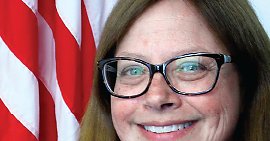APA strongly supports the nomination of Elinore McCance-Katz, M.D., Ph.D., to be the first...
Congressional Briefing Emphasizes Actions Necessary to Address Substance Use Disorder Crisis

Smita Das, M.D., Ph.D., M.P.H. (pictured at left), chair of APA’s Council on Addiction Psychiatry, was among a panel of experts who spoke to members of Congress and their staffs on Wednesday about the addiction crisis in this country and what actions Congress can take to address it.
“As a psychiatrist who has dedicated my professional career to helping patients, I want to make clear that addiction is a chronic brain disorder, and it can be effectively treated,” Das said during the briefing, which was titled “A National Response to a Deadly Crisis: SUPPORT Full-Spectrum Addiction Care.”
Important steps have been taken to address the upward trend of opioid overdoses, as well as to reduce stigma of addiction, Das said. For example, the 2018 SUPPORT for Patients and Communities Act addressed many aspects of the opioid epidemic, including prevention, treatment, and recovery. But more needs to be done, Das continued. Additional investments can help to build a robust workforce trained to provide addiction care, reduce barriers to access, and expand integrated care, she said.
Reps. Annie Kuster (D-N.H.) and David Trone (D-Md.) also attended the briefing. Kuster and Trone, along with Brian Fitzpatrick (R-Pa.) and Lisa McClain (R-Mich.), are co-chairs of the Bipartisan Mental Health and Substance Use Disorder Task Force.
One of the task force’s goals is to educate members of the House to recognize that both mental and substance use disorders (SUDs) are medical conditions that can be successfully treated, Kuster said. “I feel that we have been successful [in this effort],” she said.
Das was joined on the panel by Brian Hurley, M.D., M.B.A., president of the American Society of Addiction Medicine’s Board of Directors; Natalie Kirilichin, M.D., M.P.H., representing the American College of Emergency Physicians; Kelly Dunn, Ph.D., M.B.A., M.S., representing the American Psychological Association; and Philip Rutherford, chief operating officer of Faces & Voices of Recovery, which advocates for people in recovery from SUDs.
The briefing focused on four themes:
- Prioritize prevention, health, wellness, and equity: The speakers emphasized the importance of investments in policies and programs that address underlying structural and social determinants of addiction.
- Establish universal access to addiction medications as standard of care: The presenters emphasized that there are effective medications available to treat SUDs, but a significant number of people with SUDs cannot access them. Creative solutions are needed to help the many people with SUDs who do not have access to specialists for in-person care, Das said.
- Ensure appropriate coverage of, and reimbursement for, effective addiction care: Public and private payers should comprehensively cover and provide reimbursement for the entire continuum of SUD care, the presenters said. Das also emphasized the importance of mental health parity, noting that the Mental Health Parity and Addiction Equity Act was enacted in 2008, yet true parity has not been achieved.
- Strengthen the addiction care workforce: There are not enough professionals in the country with the knowledge and training to treat people with SUDs, the presenters noted. Psychiatrists are uniquely positioned to treat those with SUDs, as well as their co-occurring psychiatric disorders, Das said. “However, the shortage of psychiatrists and physicians trained in addiction medicine, addiction psychiatry, or pain management has created a long-standing, acute treatment gap for those with or at risk for SUDs,” she said.
More needs to be done to close the SUD treatment gap, Das said. Solutions include increasing access, decreasing stigma, coordinating care, and working together to help patients and communities recover from the impact the crisis has had on the country. “We must treat substance use disorders as the chronic diseases that they are,” Das said.
For related information, see the Psychiatric News article “Congress Removes X-Waiver Requirement.”
(Image: Katie O'Connor)
Don't miss out! To learn about newly posted articles in Psychiatric News, please sign up here.






